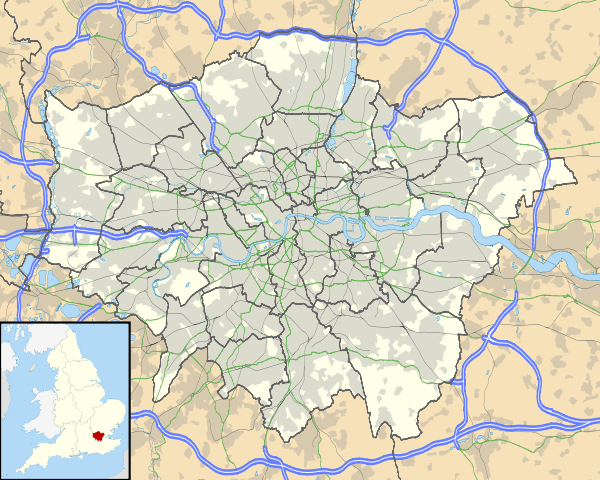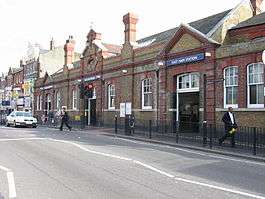East Ham tube station
| East Ham | |
|---|---|
|
Entrance to High Street North | |
 East Ham Location of East Ham in Greater London | |
| Location | East Ham |
| Local authority | London Borough of Newham |
| Managed by | London Underground |
| Number of platforms | 2 |
| Accessible | Yes [1] |
| Fare zone | 3 and 4 |
| London Underground annual entry and exit | |
| 2012 |
|
| 2013 |
|
| 2014 |
|
| 2015 |
|
| Railway companies | |
| Original company | London, Tilbury and Southend Railway |
| Pre-grouping | Midland Railway |
| Post-grouping | London, Midland and Scottish Railway |
| Key dates | |
| 1858 | Opened |
| 1902 | District line started |
| 1936 | Metropolitan line started |
| 1948 | Ownership transferred to British Railways |
| 1962 | London–Southend withdrawn |
| 1969 | Ownership transferred to London Transport |
| 1988 | Metropolitan line renamed Hammersmith & City line |
| Listed status | |
| Listing grade | II |
| Entry number | 1245066[3] |
| Added to list | 20 January 1999 |
| Other information | |
| Lists of stations | |
| WGS84 | 51°32′20″N 0°03′06″E / 51.539°N 0.0516°ECoordinates: 51°32′20″N 0°03′06″E / 51.539°N 0.0516°E |
|
| |
East Ham is a London Underground station on High Street North in the East Ham neighbourhood of the London Borough of Newham in east London, England. The station is on the District line and Hammersmith & City line. The station was opened in 1858 by the London, Tilbury and Southend Railway on a new more direct route from Fenchurch Street to Barking. The large Edwardian station building was constructed to accommodate the electric District Railway services on an additional set of tracks opened in 1905. It has high and growing usage for a suburban station with 13.1 million entries and exits in 2010. It is in London fares zones 3 and 4.
History
The London, Tilbury and Southend Railway (LT&SR) direct line from Bow to Barking was constructed east to west through the middle of the Parish of East Ham in 1858. Prior to the building of the line trains took a longer route via Stratford and Forest Gate to the north. The new line initially also had stations at Bromley and Plaistow, with Upton Park added as the next station to the west of East Ham in 1877. District line, then known as the District Railway, service began in 1902.[4] The District line was electrified in 1905 over a second pair of tracks, and the service was cut back from Upminster to East Ham; the station then served as the eastern terminus, where passengers transferred to steam trains, until 1908 when electrification was extended to Barking. In 1936 the Metropolitan line service was introduced. In 1988 the station, along with other stations beyond Aldgate East, was transferred to the new Hammersmith & City line.[4]
Accidents and incidents
- On 12 November 1959, a passenger train overran signals and was in a rear-end collision with another standing at the station. Thirteen people were injured.[5]
Design
The station has two platforms, one for each direction. Much of the original Victorian station architecture has been retained and some restoration work was carried out during 2005. The disused platforms of the Fenchurch Street to Southend services, withdrawn in 1962, are to the south of the current platforms. A disused bay platform on the northern side of the station, closed in 1958, connected to the Tottenham and Forest Gate Railway (now the Gospel Oak to Barking line) via a curve.[6]
Services
The service frequency is 15 services per hour on the District line and 6 services per hour on the Hammersmith & City line.
Connections
London Buses routes 101, 104, 147, 238, 300, 325, 376 and 474 serve the station.
Gallery
| Wikimedia Commons has media related to East Ham tube station. |
 District line train at the eastbound platform.
District line train at the eastbound platform. 'Lightbox' destination display and canopy support detail 'LTSR' on eastbound platform.
'Lightbox' destination display and canopy support detail 'LTSR' on eastbound platform. Close-up of 'LTSR' detail on canopy support.
Close-up of 'LTSR' detail on canopy support.
References
- ↑ "Step free Tube Guide" (PDF). Transport for London. Archived (PDF) from the original on 3 June 2015.
- 1 2 3 4 "Multi-year station entry-and-exit figures" (XLS). London Underground station passenger usage data. Transport for London. April 2016. Retrieved 3 May 2016.
- ↑ "The National Heritage List for England". English Heritage. Retrieved 12 November 2012.
- 1 2 Rose, D., The London Underground: A diagrammatic history, (1999)
- ↑ Earnshaw, Alan (1993). Trains in Trouble: Vol. 8. Penryn: Atlantic Books. p. 32. ISBN 0-906899-52-4.
- ↑ http://www.newhamstory.com/node/1674
External links
| Preceding station | Following station | |||
|---|---|---|---|---|
towards Hammersmith | Hammersmith & City line | Terminus |
||
| District line | towards Upminster |
| Preceding station | Disused railways | Following station | ||
|---|---|---|---|---|
| Woodgrange Park | Tottenham and Forest Gate Railway | Terminus | ||
